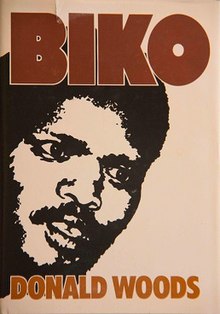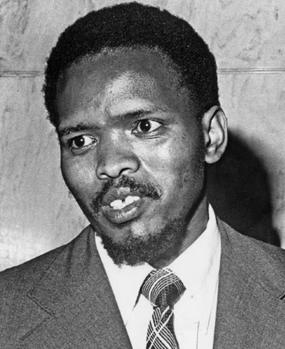
Bantu Stephen Biko OMSG was a South African anti-apartheid activist. Ideologically an African nationalist and African socialist, he was at the forefront of a grassroots anti-apartheid campaign known as the Black Consciousness Movement during the late 1960s and 1970s. His ideas were articulated in a series of articles published under the pseudonym Frank Talk.
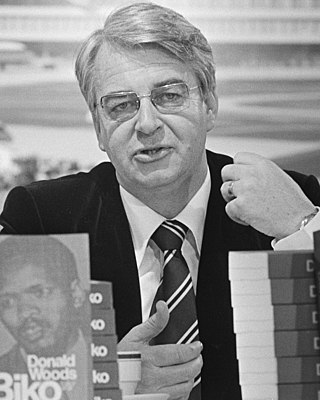
Donald James Woods was a South African journalist and anti-apartheid activist. As editor of the Daily Dispatch, he was known for befriending fellow activist Steve Biko, who was killed by police after being detained by the South African government. Woods continued his campaign against apartheid in London, and in 1978 became the first private citizen to address the United Nations Security Council.
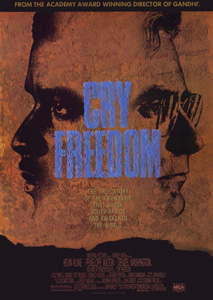
Cry Freedom is a 1987 epic biographical drama film directed and produced by Richard Attenborough, set in late-1970s apartheid-era South Africa. The screenplay was written by John Briley based on a pair of books by journalist Donald Woods. The film centres on the real-life events involving South African activist Steve Biko and his friend Woods, who initially finds him too radical, and attempts to understand his way of life. Denzel Washington stars as Biko, while Kevin Kline portrays Woods. Penelope Wilton co-stars as Woods' wife Wendy. Cry Freedom delves into the ideas of discrimination, political corruption, and the repercussions of violence.
The Black People's Convention (BPC) was a national coordinating body for the Black Consciousness movement of South Africa. Envisaged as a broad-based counterpart to the South African Students' Organisation, the BPC was active in organising resistance to apartheid from its establishment in 1972 until it was banned in late 1977.

The Black Consciousness Movement (BCM) was a grassroots anti-apartheid activist movement that emerged in South Africa in the mid-1960s out of the political vacuum created by the jailing and banning of the African National Congress and Pan Africanist Congress leadership after the Sharpeville Massacre in 1960. The BCM represented a social movement for political consciousness.
[Black Consciousness'] origins were deeply rooted in Christianity. In 1966, the Anglican Church under the incumbent, Archbishop Robert Selby Taylor, convened a meeting which later on led to the foundation of the University Christian Movement (UCM). This was to become the vehicle for Black Consciousness.
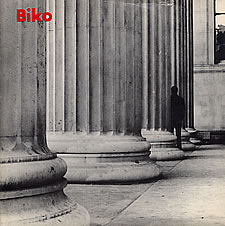
"Biko" is an anti-apartheid protest song by English rock musician Peter Gabriel. It was released by Charisma Records as a single from Gabriel's eponymous third album in 1980.
The South African Students' Organisation (SASO) was a body of black South African university students who resisted apartheid through non-violent political action. The organisation was formed in 1969 under the leadership of Steve Biko and Barney Pityana and made vital contributions to the ideology and political leadership of the Black Consciousness Movement. It was banned by the South African government in October 1977, as part of the repressive state response to the Soweto uprising.
James Thomas Kruger was a South African lawyer and politician of Welsh descent who was part of the conservative National Party government which championed apartheid. He rose to the position of Minister of Justice and the Police in the cabinet of Prime Minister John Vorster from 1974 to 1979. He was also President of the Senate from 1979 until 1980, when it was abolished.
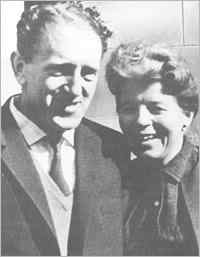
Hilda Bernstein OLG was a British-born author, artist, and an activist against apartheid and for women's rights.
Bruce Douglas Haigh was an Australian political commentator and diplomat. He joined the Australian Department of Foreign Affairs in 1972 and served in South Africa.

There is a wide range of ways in which people have represented apartheid in popular culture. During (1948–1994) and following the apartheid era in South Africa, apartheid has been referenced in many books, films, and other forms of art and literature.

Internal resistance to apartheid in South Africa originated from several independent sectors of South African society and took forms ranging from social movements and passive resistance to guerrilla warfare. Mass action against the ruling National Party (NP) government, coupled with South Africa's growing international isolation and economic sanctions, were instrumental in leading to negotiations to end apartheid, which began formally in 1990 and ended with South Africa's first multiracial elections under a universal franchise in 1994.
Neville Wilson Curtis was an anti-apartheid activist and leader of the National Union of South African Students.
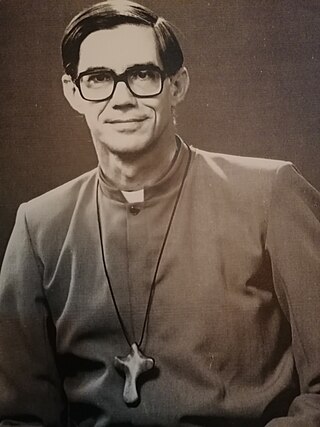
David Patrick Hamilton Russell was a South African Anglican bishop.
Gideon Nieuwoudt (1951–2005) was a former apartheid-era security policeman involved in the torture and murder of several anti-apartheid activists, including Steve Biko. Nieuwoudt, nicknamed "Notorious", was one of the most feared security policemen in the Eastern Cape for his interrogation methods including wet bags, poison, torture machines and often disguised himself as a priest, dubbing him the "Priest from hell". Nieuwoudt had up to five hearings at the Truth and Reconciliation Commission (TRC), in connection with the murders of numerous political activists.
Mapetla Mohapi was a member of the Black Consciousness Movement, who died in detention during Apartheid in 1976.

The apartheid regime in South Africa began in 1948 and lasted until 1994. It involved a system of institutionalized racial segregation and white supremacy, and placed all political power in the hands of a white minority. Opposition to apartheid manifested in a variety of ways, including boycotts, non-violent protests, and armed resistance. Music played a large role in the movement against apartheid within South Africa, as well as in international opposition to apartheid. The impacts of songs opposing apartheid included raising awareness, generating support for the movement against apartheid, building unity within this movement, and "presenting an alternative vision of culture in a future democratic South Africa."
Winnie Motlalepula Kgware was a South African anti-Apartheid activist within the Black Consciousness Movement (BCM). She was elected as the first president of the Black People's Convention (BPC), a BCM-affiliated community-based organisation in 1972.
Wendy Heather Woods was a South African educator and anti-apartheid activist. Woods worked with her husband, journalist Donald Woods, on anti-apartheid activities and both fled into exile to the United Kingdom in 1977. Woods herself was an active member of the Black Sash. In exile, Woods worked with various charities and after her husband's death, set up the Donald Woods Foundation. She and her family are featured in the 1987 movie Cry Freedom.
